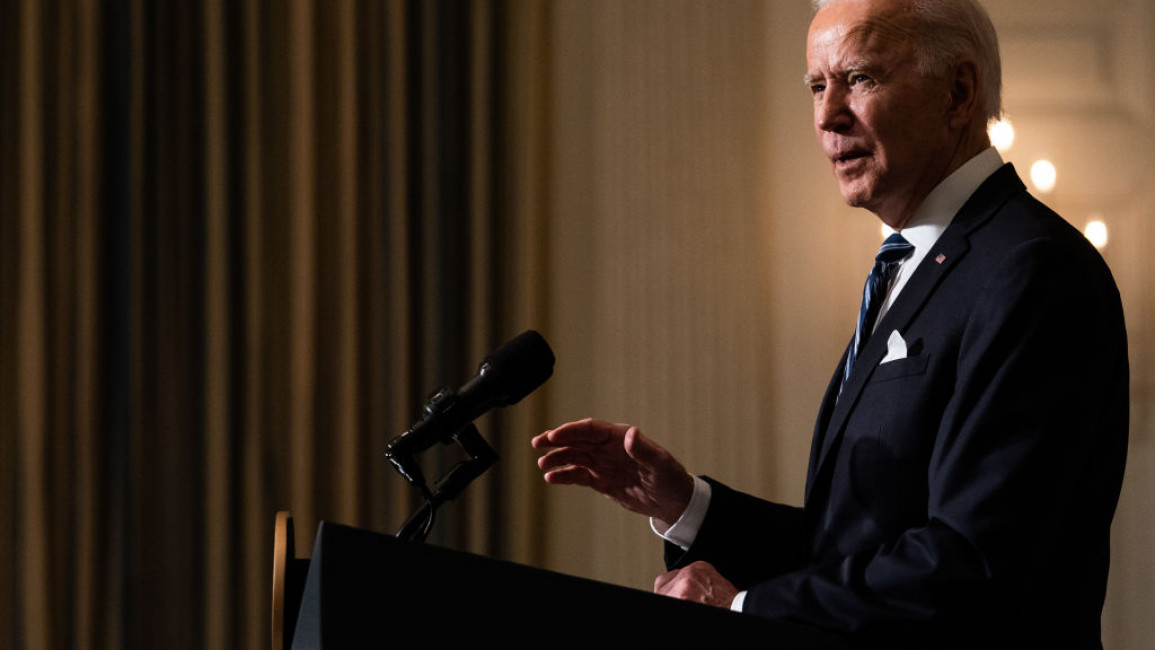US President pushes for ‘compromise solution’ after clashes between the UAE and Saudi Arabia stall OPEC+ talks
The Biden administration is pushing for a "compromise solution" in stalled OPEC+ oil output talks, a White House spokesperson said on Monday.
OPEC+ ministers called off talks on Monday after the United Arab Emirates rejected a proposed eight-month extension to curbs on output. Four OPEC+ sources told Reuters there has been no progress toward a deal.
"The United States is closely monitoring the OPEC+ negotiations and their impact on the global economic recovery from the COVID-19 pandemic," the White House spokesperson said in a statement.
"We are not a party to these talks, but Administration officials have been engaged with relevant capitals to urge a compromise solution that will allow proposed production increases to move forward."
US President Joe Biden has made economic recovery from the recession triggered by the coronavirus pandemic a key priority for his administration. A rise in oil prices - which are at their highest levels since 2018 - has fuel concerns about inflation.
Stable oil market conditions are needed to power the recovery and meet the administration's goal of affordable and reliable energy, Biden aides said on condition of anonymity.
The failure of the talks helped to drive up international benchmark Brent crude oil, which was trading above $77 a barrel on Monday.
OPEC+, which groups the Organization of the Petroleum Exporting Countries with Russia and other big producers, agreed to record output cuts of almost 10 million barrels per day (bpd) last year, equivalent to about 10 percent of world output as the pandemic hit.
The curbs have been gradually relaxed and currently stand at about 5.8 million bpd.
However, no deal to boost oil production has been agreed at the recent OPEC+ talks.
OIL MARKET: WTI crude hits a 6-year high of $76.94 a barrel after the collapse of the OPEC+ talks | #OOTT
— Javier Blas (@JavierBlas) July 6, 2021
Tensions boil between Saudi Arabia and UAE over oil output
The UAE, sources said, on Friday accepted a proposal from Saudi Arabia and other OPEC+ members to raise output in stages by about 2 million bpd from August to December.
However, the UAE then rejected a proposed eight-month extension to cutting oil output - which would take effect to the end of 2022 from a current end date of April without adjusting current baseline production.
The UAE is upset about the low baseline from which its production cuts are calculated and wants it raised. Abu Dhabi has invested billions of dollars to increase its production capacity and says its baseline was set too low when OPEC+ originally forged their pact.
The UAE said it was not alone in seeking a higher baseline as others, including Azerbaijan, Kazakhstan, Kuwait and Nigeria, requested and received new ones since the deal was first agreed last year.
Saudi energy minister Prince Abdulaziz bin Salman had called for "compromise and rationality" to secure a deal.
But four OPEC+ sources said there had been no progress and decisions in OPEC+ must be unanimous.
Some OPEC+ sources said there would be no oil output increase in August, while others said a new meeting would take place in the coming days and they believed there will be a boost in August.
"There is no decision about August and discussions still continue. The market needs that oil," one source familiar with the talks said.
The dispute reflects a growing divergence between Saudi Arabia and the UAE.
The two nations had built a regional alliance, combining financial and military muscle to fight a conflict in Yemen and project power elsewhere.
But the UAE has withdrawn from action in Yemen, while Saudi Arabia has sought to challenge the UAE's dominance as the region's business and tourism hub.
The UAE in August 2020 also agreed to normalise relations with Israel, while Saudi Arabia has no official diplomatic relations with Israel.



